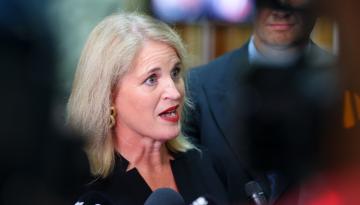Jobseeker beneficiaries will now have to attend work check-ins every six months or risk having their benefits cut, the Government has announced.
It's another requirement in the Coalition Government's crackdown on beneficiaries alongside attending a work seminar and a traffic light system of sanctions for those who do not comply.
From today, jobseekers, excluding those with a health condition, injury or disability, will meet with the Ministry of Social Development to assess how their job search is going every six months.
The check-ins are compulsory and if someone misses one without good reason, their benefit may be reduced or stopped.
Social Development and Employment Minister Louise Upston said about 20,000 jobseekers are expected to attend the Ministry's new 'Work check-in' seminars over the next 12 months.
"These check-ins will ensure a larger number of job seekers have more regular contact with MSD, providing more opportunity to gauge their progress and make sure they are receiving the right support and job training," Upston said.
She said about 190,000 people currently receive Jobseeker Support but only about 53,000 have employment case managers at any given time.
"I'm concerned the other 137,000 job seekers can go many months without talking to MSD about how they are progressing, with some not having to check back in until they reapply for their benefit 12 months later," Upston said.
The check-ins build on the Government's compulsory Kōrero Mahi – Let's Talk Work seminars which a jobseeker beneficiary must attend within a fortnight of coming on to the benefit.

Upston said the check-ins are a precursor to the Government's plan to introduce mandatory reapplication for Jobseeker Support benefits every six months.
"These interventions will help get job seekers back on their feet quickly. MSD will make sure their profiles and CVs are up to date, offer interview tips, and direct them to job websites and vacancies or further training."
The Government has set a target to have 50,000 fewer people on Jobseeker Support benefits by 2030. It said the number of people on the support grew by 40,000 under the previous Labour Government.
"This Government believes those who can work, should work, because having a job is the best way for people to lift themselves and their families out of hardship," Upston said.
The Government has been accused of "beneficiary bashing" by the Opposition.
The Green Party said the check-ins would add to the stigma beneficiaries face.
"We've seen in previous decades how check-ins contributed more to the negative stigma of being unemployed, and there’s no evidence that they help people into meaningful employment. But this Coalition has a habit of taking the country backwards," Green Party's social development spokesperson Ricardo Menéndez March said.
Menéndez March said the Government refuses to measure whether seminars actually help people into employment and should instead establish networks for more tailored support for people to retrain and prepare for work opportunities suitable to their skill set.
"The Government is more interested in punishing the poor than actually helping people into good employment," he said.

Earlier this year, Upston ordered MSD to use the full force of sanctions to ensure those on the jobseeker benefit were actively looking for work.
The Government will introduce a 'traffic light system' policy, where the consequences of beneficiaries not fulfilling their obligations to try and find employment would be clear. Upston said in February this system would take time to develop.
The 'green' light is for those who are compliant with their obligations to find or prepare to find work. They receive their benefit as normal and are not subject to any further requirements or sanctions.
Those under the 'orange light' are at "some risk", according to the National policy document. These are clients who have received one or two warnings that they aren't fulfilling their obligations. As a result, they may be made to have more frequent check-ins with WINZ or have to do mandatory training.
The 'red' light is for those at "high risk", meaning they have had three or more warnings. Several sanctions can be applied to these people, including either cutting or suspending their benefit, subjecting them to money management or making them do community work.


